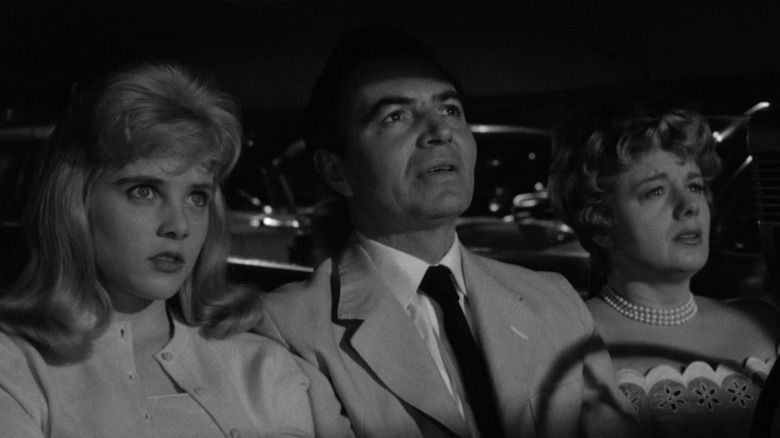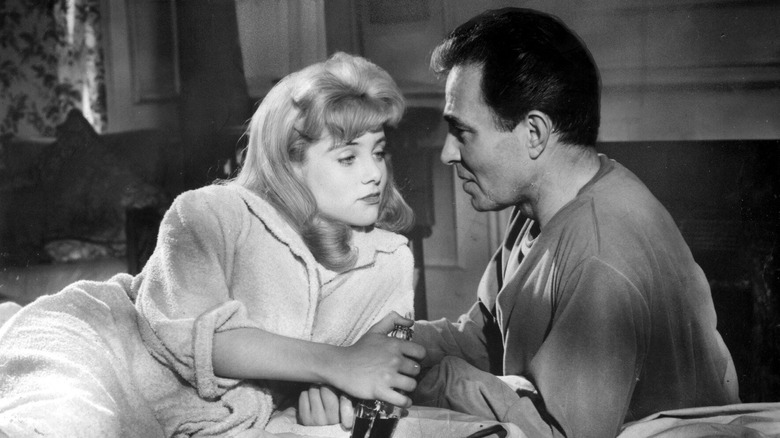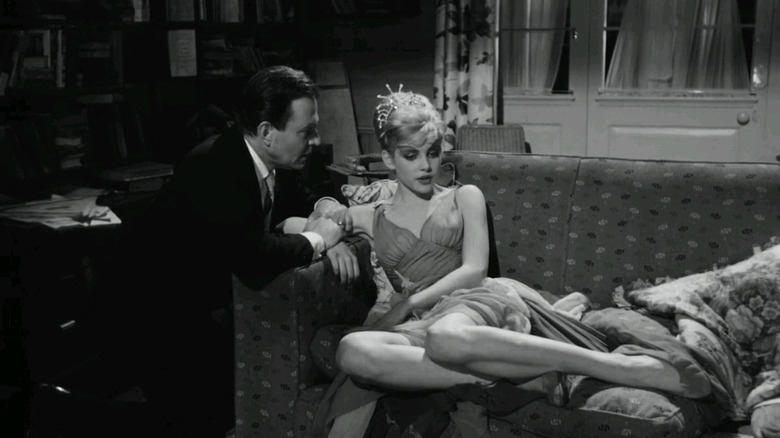Stanley Kubrick Had A Pretty Questionable Regret About The Way He Handled Lolita
Stanley Kubrick pushed a lot of boundaries as a filmmaker, but perhaps most controversial was his adaptation of Vladimir Nabokov's famed novel, "Lolita." The story centers around a middle-aged man's affection for a teenage girl, a romance that raised eyebrows when the film was released in 1962 and it is still the subject of controversy to this day. The director had no regrets about making such a scandalous film — in fact, he wished he had pushed the envelope even further.
"Lolita" was an incredibly successful novel before it was made into a movie. However, it wasn't the book's popularity that attracted Kubrick to the project. "We bought it when it had not yet appeared on the New York Times bestseller list," the filmmaker revealed to The Guardian. "We never dreamed of the popularity that the book would achieve. We thought it would be popular, but how could one guess that it would become the number one bestseller in the world?"
Instead, it was the content of the story that caught the director's attention. "To me, Lolita seemed a very sad and tender love story," he explained. He likened it to other famous love stories, like Anna Karenina and Romeo and Juliet, that have also "estranged themselves from society." Kubrick felt that this alienation encouraged the viewer to think critically.
"It seems to me one of the wonderful things about Lolita is that it shocks, because of the relationship," the filmmaker said. "You are prevented from making a premature and overly sympathetic judgment of Humbert's position by the shock that's created in your mind."
...It wasn't erotic enough
Kubrick was forced to make "Lolita" overseas due to the controversial subject matter. The restrictive Hays morality code had kept sex out of Hollywood for decades and only started to loosen its grip right around the time "Lolita" was made. When Kubrick first acquired the rights to the book in the mid-50s, it made sense to seek funding for such a suggestive film overseas.
"[T]he only funds I could raise for the film had to be spent in England," Kubrick explained to Joseph Glemis, per Scraps from the Loft. "There's been such a revolution in Hollywood's treatment of sex over just the past few years that it's easy to forget that when I became interested in Lolita a lot of people felt that such a film couldn't be made – or at least couldn't be shown. As it turned out, we didn't have any problems, but there was a lot of fear and trembling."
Despite filming in England, Kubrick still planned to release the film in America. Consequently, the strict production code and Catholic Legion of Decency hung like a spectre over the set. These concerns forced the director to make 'safer' and less overtly sexual choices than Nabokov had in the original text.
"If I could do the film over again, I would have stressed the erotic component of their relationship with the same weight Nabokov did," the director admitted. "But that is the only major area where I believe the film is susceptible to valid criticism."
Yes, you read that correctly. It wasn't erotic enough.
"Lolita" is a morally gray film, but it is not devoid of morality. Kubrick firmly believed that the true twist of the story was that Humbert was not merely a predator, attracted to Lolita for her youth, but was truly and madly in love with her. By underplaying the eroticism of the relationship, Kubrick jumped the gun. "Because his sexual obsession was only barely hinted at, many people guessed too quickly that Humbert was in love with Lolita," he lamented.
This twist was the crux of the story for Kubrick. "The audience will start by being repelled by this 'creep' who seduces a not-so-innocent child," the director explained to The New York Times, "but gradually, as they realize he really loves the girl, they'll find that things aren't quite as simple as they seemed, and they won't be so ready to pass moral judgments."
Nabokov was credited with writing the film's screenplay, but the final product was a heavily modified version of the script he had given Kubrick. Despite being cut out of the production, he still enjoyed the director's interpretation of his work.
"I thought the movie was absolutely first-rate," the author told Playboy, per Scraps from the Loft. "I must point out, though, that I had nothing to do with the actual production. If I had, I might have insisted on stressing certain things that were not stressed—for example, the different motels at which they stayed." It seems that, like Kubrick, Nabokov wished that the erotic relationship between Lolita and Humbert was more heavily emphasized in the film.
If Kubrick's 1962 film had been any more erotic, it may never have been greenlit. Still, his regret begs the question — is it any better that he substituted this sexuality with touching moments of romance between a middle-aged man and a 12-year-old?


